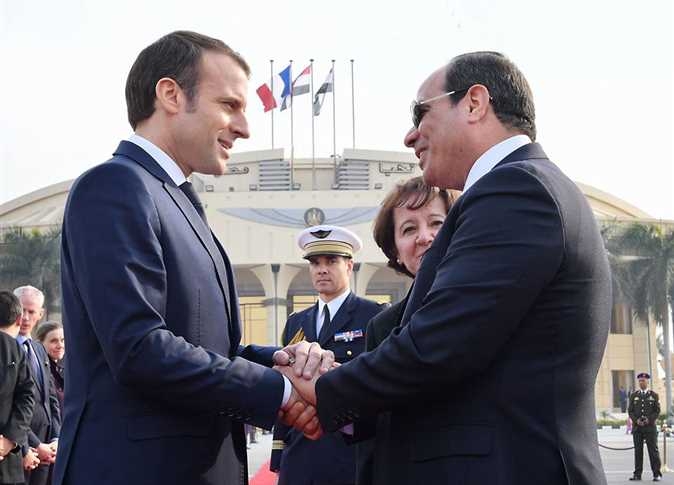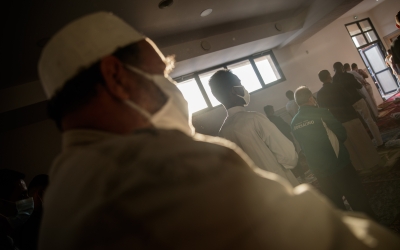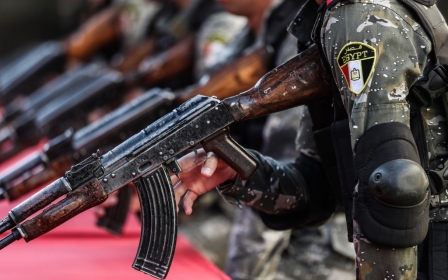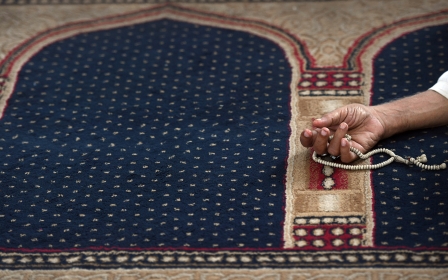Egypt's Sisi arrives in France for controversial visit

Egyptian President Abdel Fatah el Sisi arrived in France on Sunday evening for a three-day visit amid international criticism for jailing three activists who had met with European diplomats.
Sisi will dine with French Foreign Minister Jean-Yves Le Drian on Sunday evening before holding talks with Macron at the Elysee Palace on Monday to cement the strategic partnership between Cairo and Paris.
Rights groups have urged Macron to raise the issue of human rights after activists from the Egyptian Initiative for Personal Rights (EIPR) were arrested in November for meeting with diplomats from France, the United States and several other European countries.
The three activists were released on Thursday following an international outcry, but the EIPR's assets have now been frozen by the Egyptian public prosecutor. A hearing will take place later on Sunday to determine whether to uphold the public prosecutor's order.
Troubling human rights record
New MEE newsletter: Jerusalem Dispatch
Sign up to get the latest insights and analysis on Israel-Palestine, alongside Turkey Unpacked and other MEE newsletters
France was quick to condemn Egypt for jailing the EIPR activists and said it had "deep concern" over the arrests. Egypt, however, was quick to rebuff France's criticism, calling it an attempt to interfere in its internal affairs and influence its investigations.
Under Sisi, Egypt has seen a widespread crackdown against human rights groups and independent media, with thousands detained since his election in 2014. Executions in the country have also spiked this year, with dozens carried out after questionable trials in recent months.
"French diplomacy has, at the highest levels, long indulged President al-Sisi's brutal repression of any form of dissent," a dozen human rights groups including Human Rights Watch, Amnesty International and the International Federation for Human Rights (FIDH) wrote in a joint statement ahead of the Egyptian leader's visit.
"It is now or never for President Macron to stand up for his self-declared commitment to promote human rights in Egypt."
The statement also noted that France was Egypt's main arms supplier and that Paris allowed French companies to provide Cairo with surveillance and crowd control tools, despite the Sisi government's troubling human rights record.
Rights groups are expected to hold a protest outside the French parliament on Tuesday, where they will denounce the "strategic partnership" between France and Egypt.
A French presidential official told AFP that the release of the EIPR workers was a "positive signal" and emphasised that rights issues would be brought up by Macron.
Macron raised human rights concerns during a visit to Cairo in January 2018, saying "respect for individual freedoms, [the] dignity of everyone and the rule of law".
The French leader had been criticised by rights groups during a previous visit by Sisi to Paris in October 2017, when he said that he would not "lecture" Egypt on liberties.
Egyptian authorities are accused of detaining more than 60,000 political prisoners since Sisi ousted his democratically elected predecessor, Mohamed Morsi, in a 2013 military coup.
Those jailed in Egypt include Palestinian-Egyptian activist Ramy Shaath, husband of French national Celine Lebrun, held since July 2019 on accusations of acting against the state.
"His case is completely empty, and the accusations are devoid of any proof," Lebrun told AFP, saying she had been able to speak to her husband only twice by phone since his arrest.
Allies with shared interests
Macron and Sisi are aligned in their opposition to the growing influence of Turkey in the Middle East and North Africa, as well as in their crackdowns on political Islam.
French-Turkish relations have deteriorated in recent months after Macron called Islam "a religion in crisis," while his government has pushed forward legislation seeking to combat "separatism" in France, which rights groups have warned could indiscriminately target France's Muslim community.
Turkish President Recep Tayyip Erdogan called for a boycott of French products in October following Macron's comments on Islam and the French president's defence of cartoons of Prophet Muhammad in the wake of the killing of a French schoolteacher who had shown one such image in class.
In the run-up to Sisi's visit, Erdogan said that France should "get rid of" Macron "as soon as possible".
France's priority is the reinforcement of the "strategic partnership" with the most populous country in the Arab world, which an official from the French presidency has called a centre of "stability" in a volatile region.
Middle East Eye delivers independent and unrivalled coverage and analysis of the Middle East, North Africa and beyond. To learn more about republishing this content and the associated fees, please fill out this form. More about MEE can be found here.






